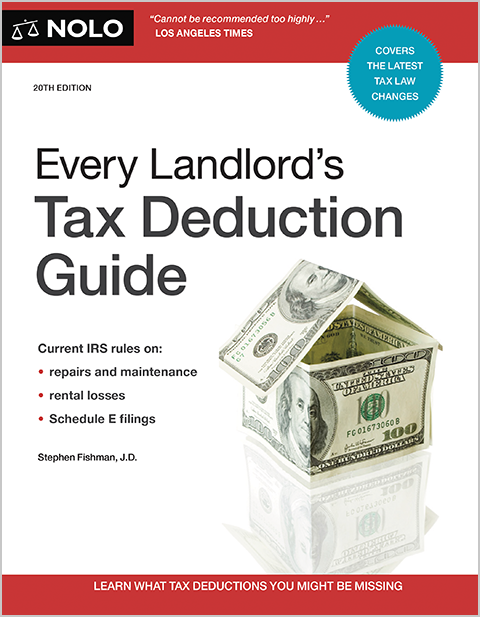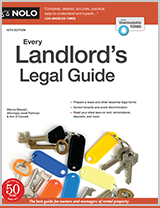Bestseller!
Every Landlord's Tax Deduction Guide
- Product Details
- handle casualty and theft losses
- distinguish between repairs and improvements
- deduct home office, car, travel, and meals
- keep proper tax records—and much more.
- About the Author
- Table of Contents
- How Landlords Are Taxed
- What Is Rental Income?
- How Income Tax Deductions Work
- How Property Ownership Affects Taxes
- The Landlord Tax Categories
- Business Owner Versus Investor
- Are You Profit Motivated?
- Requirements for Deducting Operating Expenses
- Operating Expenses That Are Not Deductible
- IRS Rules: Repairs Versus Improvements
- How to Deduct Repairs and Maintenance
- Depreciation: The Landlord’s Best Tax Break
- Understanding the Basics
- How to Depreciate Buildings
- Depreciating Land Improvements
- Deducting Personal Property
- When You Sell Your Property
- Tax Reporting and Record Keeping for Depreciation
- Determining the Value of Your Land and Buildings
- Cost Segregation
- Your Rental Activity Must Be a Business
- You Must Have a Pass-Through Business
- You Must Have Qualified Business Income
- You Must Have Taxable Income
- Calculating Your Pass-Through Deduction
- Landlords Who Own Multiple Properties
- Strategies to Maximize the Pass-Through Deduction
- Landlord Business Safe Harbor Rule
- Interest Landlords Can (and Can’t) Deduct
- Mortgage Interest
- Other Interest Expenses
- Points and Prepaid Interest
- Interest on Construction Loans
- Loans With Low or No Interest
- Loans on Rental Property Used for Nonrental Purposes
- Limitation on Interest Deductions by Landlords Earning $29 Million or More
- What Are Start-Up Expenses?
- Determining Your Business Start Date
- How to Deduct Start-Up Expenses
- If Your Business Doesn’t Last 15 Years
- If Your Business Never Begins
- Qualifying for the Home Office Deduction
- Calculating the Home Office Deduction
- Simplified Home Office Deduction Method
- IRS Reporting Requirements
- Deducting an Outside Office
- Deductible Local Transportation Expenses
- The Standard Mileage Rate
- The Actual Expense Method
- Tax Credits and Deductions for Electric Vehicles
- Other Local Transportation Expenses
- Reporting Transportation Expenses on Your Tax Return
- What Are Travel Expenses?
- Deductible Travel Expenses
- How Much You Can Deduct
- Deducting Payments to Workers
- Employees vs. Independent Contractors
- Tax Rules When Hiring Independent Contractors
- Tax Rules for Employees
- Hiring Your Family
- Hiring a Resident Manager
- COVID-19 Tax Credits for Landlord Employers
- What Is a Casualty?
- Calculating a Casualty Loss Deduction
- Federally Declared Disaster Area Losses
- Casualty Gains
- Repair and Replacement Costs for Casualty Losses
- Tax Reporting and Record Keeping for Casualty Losses
- Business Energy Investment Tax Credit
- Dues and Subscriptions
- Education Expenses
- Gifts
- Insurance for Your Rental Activity
- Legal and Professional Services
- Meals and Entertainment
- Taxes
- Unpaid Rent
- What Are Rental Losses?
- Overview of the Passive Loss Rules
- The $25,000 Offset
- The Real Estate Professional Exemption
- Deducting Suspended Passive Losses
- Tax Reporting for Passive Rental Losses
- Strategies for Dealing With the Passive Loss Rules
- Annual Loss Limits
- At-Risk Rules
- How to Deduct Rental Losses
- What Records Do You Need?
- A Simple Record-Keeping System
- Accounting Methods
- Who Must File Schedule E?
- Filling Out Schedule E
- How the NIIT Works
- Real Estate Professional Exemption From the NIIT
- Planning to Avoid the NIIT
- Sample Chapter
Rental real estate provides more tax benefits than almost any other investment. If you own residential rental property, Every Landlord’s Tax Deduction Guide is an indispensable guide, focusing exclusively on IRS rules and deductions for landlords.
This book covers the latest tax laws, including the rules for deducting a net operating loss (NOL) and claiming an NOL refund. Learn about landlord tax classifications, reporting rental income, hiring workers, and depreciation.
Find out how to:
Filled with practical advice and real-world examples, Every Landlord’s Tax Deduction Guide will save you money by helping you owe less to the IRS at tax time.
“Cannot be recommended too highly …”—Los Angeles Times
“The best of the best…”—Chicago Tribune
Introduction
1. Tax Deduction Basics for Landlords
2. Landlord Tax Classifications
3. Deducting Your Operating Expenses
4. Repairs
5. Depreciation Basics
6. Maximizing Your Depreciation Deductions
7. The Pass-Through Tax Deduction
8. Interest
9. Start-Up Expenses
10. The Home Office Deduction
11. Car and Local Transportation Expenses
12. Travel Expenses
13. Hiring Help
14. Casualty and Theft Losses
15. Additional Deductions and Credits
16. Deducting Rental Losses
17. Record Keeping and Accounting
18. All About Schedule E
19. The Net Investment Income Tax
Index
Introduction
This book is about income tax deductions for landlords—that is, people who own residential rental property. If you’re one of the millions of Americans who owns a small number of residential rental units (1 to 10), this book is for you. And even landlords who own dozens of residential rental properties will find lots of useful information in this book that can help them save money.
As you probably know, being a landlord isn’t easy. But one thing you have going for you is the tax law. Few profit-making activities provide more tax benefits than owning rental property.
No landlord would pay more than necessary for utilities or other operating expenses for a rental property. But, every year millions of landlords pay more taxes on their rental income than they have to. Why? Because they fail to take advantage of all the tax deductions available to owners of residential rental property. That’s where this book comes in. It gives you all the information you need to maximize your deductions—and avoid common deduction mistakes. You can (and should) use this book all year long, to make April 15 as painless as possible.
When it comes to understanding your taxes, you need guidance more than ever. In 2017, Congress enacted the most sweeping changes to the tax code in more than 30 years when it passed the Tax Cuts and Jobs Act (TCJA), which took effect in 2018. In an effort to stave off economic devastation in the wake of the coronavirus (COVID-19) pandemic, Congress revised the nation’s tax laws yet again for 2020 and 2021, temporarily suspending many of the harshest provisions of the TCJA. In 2022, most of these temporary measures ended and Congress enacted the Inflation Reduction Act. This legislative package, among other things, expanded tax benefits for electric vehicles and green energy, and substantially increased funding for the IRS.
Even if you work with an accountant or another tax professional, you need the information in this book. It will help you provide your tax professional with better records, ask better questions, obtain better advice, and, just as importantly, evaluate the advice you get from tax professionals, websites, and other sources.
If you do your taxes yourself (as more and more landlords are doing, especially with the help of tax preparation software), your need for knowledge is even greater. Not even the most sophisticated tax software can decide which tax deductions you should take or tell you whether you’ve overlooked a valuable deduction. This book provides do-it-yourselfers with the practical advice and information they need to take full advantage of the many deductions available to landlords.
This book is written for traditional landlords who rent out their property full time to long-term tenants. If you rent your property to short-term guests through Airbnb, VRBO, or any other short-term rental platform and want tax guidance, see Every Airbnb Host’s Tax Guide by Stephen Fishman.
We hope you enjoyed this sample. The complete book is available for sale here at Nolo.com.
-
Excellent resource
-
I use this as an essential reference guide to assist me in my residential real estate investments.
Posted on 12/8/2023
-
The Best!
-
I only wish I had known about this reference years ago. The author has explained and simplified the ever-increasingly complex Tax codes into a guide that even I could follow!
Posted on 12/8/2023
-
Priceless info!
-
This book easily put hundreds or thousands back in my pocket each and every year.
Posted on 12/8/2023

